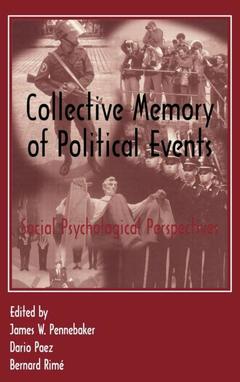Collective Memory of Political Events Social Psychological Perspectives
Coordonnateurs : Pennebaker James W., Paez Dar¡o, Rim‚ Bernard, Paez Dario

Research in collective memory is a relatively new area capturing the interest of scholars in social psychology, memory, sociology, and anthropology. The core idea is that collective attitudes and behaviors are created and shared through common experiences and communication among a cohort of people. For example, people born between 1940 and 1960 are often defined via the JFK assassination and the Vietnam War. Their parents typically experienced lesser impact from these events.
Papers about collective memory have appeared in the literature under different guises for the last hundred years. Freud's Civilization and Its Discontents, Jung's ideas on the collective unconscious, and McDougall's speculation on the group mind posited that identity and action could be viewed as resulting from the shared development of a culture. Halbwachs, a French social psychologist (1877-1945) who was the first to write in detail about the nature of collective memory, argued that basic memory processes were all social. That is, people remember only those events that they have repeated and elaborated in their discussions with others.
In the last several years, there has been a resurgence of interest in this general topic because it addresses some fundamental questions about memory and social processes. Work closely related to these questions deals with the nature of autobiographical memory, traumatic experience and reconstructive memory, and social sharing of memories. This book brings together an international group of researchers who have been empirically studying some basic tenets of collective memory.
Contents: J.W. PennebakerIntroduction. Part I:The Life of Collective Memories.J.W. Pennebaker, B.L. Banasik, On the Creation and Maintenance of Collective Memories: History as Social Psychology. M.A. Conway, The Inventory of Experience: Memory and Identity. H. Schuman, R.F. Belli, K. Bischoping, The Generational Basis of Historical Knowledge. J. Igartua, D. Paez, Art and Remembering Traumatic Collective Events: The Case of the Spanish Civil War. N.H. Frijda, Commemorating. Part II:Social and Emotional Processes of Collective Memories.B. Rimé, V. Christophe, How Individual Emotional Episodes Feed Collective Memory. D. Paez, N. Basabe, J.L. Gonzalez, Social Processes and Collective Memory: A Cross-Cultural Approach to Remembering Political Events. G.D. Gaskell, D.B. Wright, Group Differences in Memory for a Political Event. C. Finkenauer, L. Gisle, O. Luminet, When Individual Memories Are Socially Shaped: Flashbulb Memories of Sociopolitical Events. G. Bellelli, M.A.C. Amatulli, Nostalgia, Immigration, and Collective Memory. Part III:The Construction, Distortion, and Forgetting of Collective Experiences.E. Lira, Remembering: Passing Back Through the Heart. L. Íñiguez, J. Valencia, F. Vázquez, The Construction of Remembering and Forgetfulness: Memories and Histories of the Spanish Civil War. J. Marques, D. Paez, A.F. Serra, Social Sharing, Emotional Climate, and the Transgenerational Transmission of Memories: The Portuguese Colonial War. R.F. Baumeister, S. Hastings, Distortions of Collective Memory: How Groups Flatter and Deceive Themselves.
Date de parution : 03-1997
15.2x22.9 cm
Date de parution : 05-2015
15.2x22.9 cm
Thème de Collective Memory of Political Events :
Mots-clés :
flashbulb; memories; social; sharing; university; basque; country; traumatic; portuguese; colonial; Grupo De Apoyo Mutuo; La Vaquilla; Young Men; Flashbulb Memories; Portuguese Colonial War; Collective Traumatic Events; Positive Cognitive Biases; Transactive Memory; Social Sharing; Reminiscence Bump; SCW; Spanish Civil War; Violated; Collective Self-deception; Overt Rehearsal; World War Ii Commemoration; Naive Patriotism; Civil War; West Germany; SAS CALIS Procedure; Principle Research Questions; Fb Memory Formation; Psychosocial Vulnerability; Marked Availability; Large Magellanic Cloud



